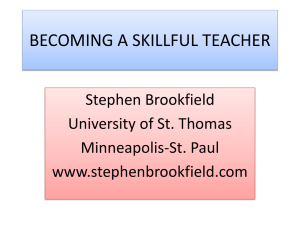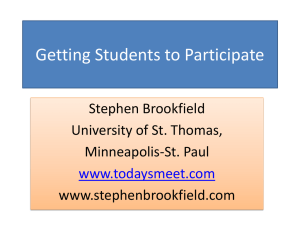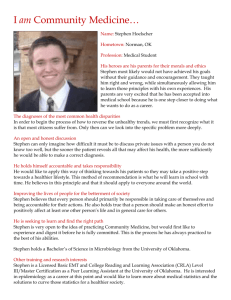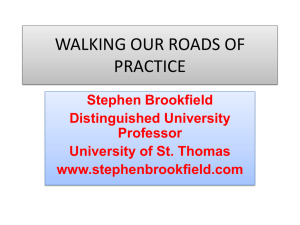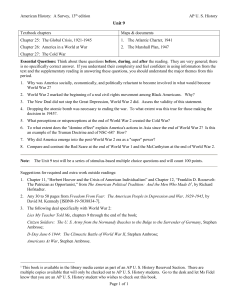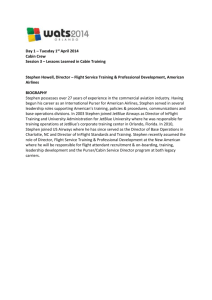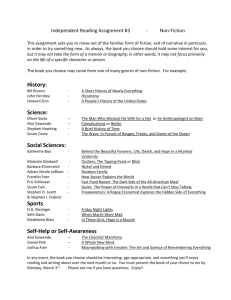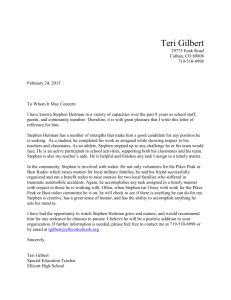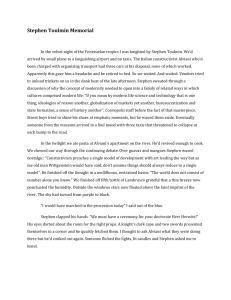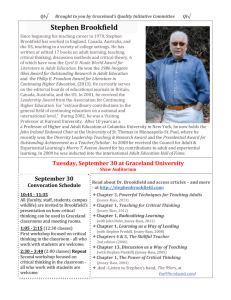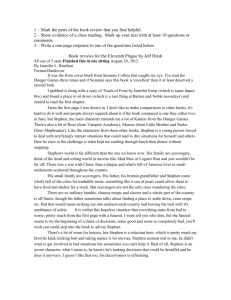The Emotional Rhythms of College Learning
advertisement
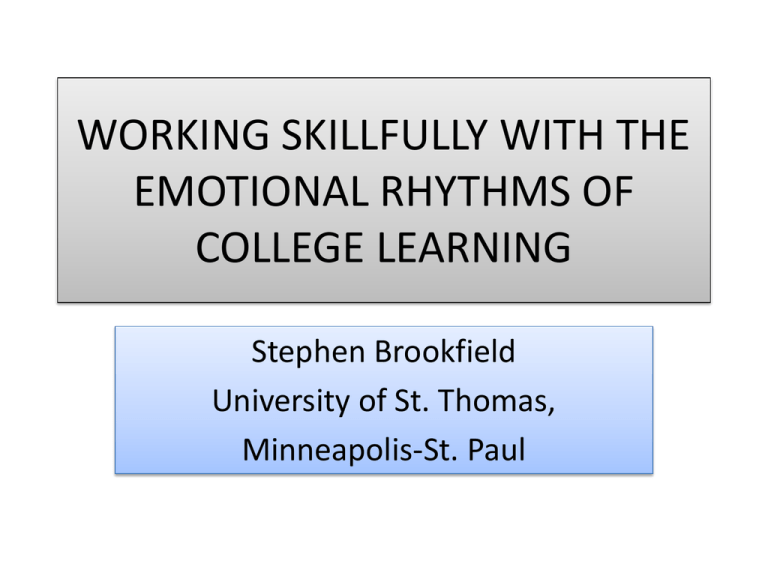
WORKING SKILLFULLY WITH THE EMOTIONAL RHYTHMS OF COLLEGE LEARNING Stephen Brookfield University of St. Thomas, Minneapolis-St. Paul Situating Myself • How we learn frames how we teach • Exam Failure – Subverting standardized measures / the importance of secretaries • My Doctoral Study - the relational underpinning to teaching Core Assumption (1) • Good teaching is equivalent to whatever helps students learn • Much more complex than it appears since what helps one student learn may be confusing or intimidating to another student • Example – Walking out of the 1st class & leaving the students with no teacher! Rationale • When working with resistant students your own justifications for a course are dismissed. The only voices students will take seriously are those of former resisters. • Therefore, a good strategy is to begin with a panel of former resistant students who pass on any advice they wish to new students. • During the panel you exit so new students don’t think you’re scripting what’s said Helpers of Learning • Departmental Secretaries – the sympathetic ear & the hub of all knowledge • Janitors – the power to make or break learning • Support Staff – the ‘face’ of the institution / troubleshooters & systems designers for students • Administrators – enablers of faculty learning Core Assumption (2) • Best teachers constantly check out the assumptions they’re making about how best to help students learn. • Examples • Circles encourage small group discussion & make students feel welcomed members of a democratic classroom • Visiting small groups as they conduct discussions helps students understand the material better Students’ Contrary Feedback • Circles are intimidating configurations in which students feel pressured to participate in a highly surveyed environment – a personal experience I discounted for many years • Teachers visiting small groups cause students to change behavior to perform for the teacher as ‘good’ students & actually inhibit good listening & silent processing Core Assumption (3) • The most important knowledge we need to do good work is an awareness of how students experience learning, week in, week out, in our classrooms. • This means we need to find ways of gathering accurate & valid data from students – anonymity Critical Incident Questionnaire (CIQ) • Most Engaged Moment • Most Distanced Moment • Most Helpful Action • Most Puzzling Action • What Surprised You Most How It’s Administered • Last 5 minutes of last class of the week / staff meeting • Anonymous • Mandatory when possible • Frequency Analysis • Reported back to class • Negotiation not capitulation to majority opinion CIQ – free download • www.stephenbrookfield.com • My home page has a link to the CIQ & to many other materials on … • teaching • using discussions • developing critical thinkers • becoming critically reflective • teaching about race • NO NEED TO ASK PERMISSION – YOU HAVE IT! How Do Adult Students Experience College? • Impostorship – I don’t deserve to be here & I’ll soon be found out • Cultural Suicide – Sharing enthusiasms & successes leads to exclusion from the group • Road Running – incrementally fluctuating 2 steps forward 1 step back • Peer Support Group – the parachute What Do Students Say They Look For in Us as Teachers? They need teachers to be CREDIBLE • Expertise – answering unexpected questions • Experience – using good examples • Rationale – explaining what’s happening • Conviction – individual feedback What Do Students Say They Look For in Us as Teachers? They need teachers to be AUTHENTIC • Congruence – words & actions • Full Disclosure – expectations, agendas, criteria • Responsiveness – to students’ concerns • Personhood – autobiographical examples • Error – against a backdrop of earned credibility Core Assumption (4) • Context Changes Everything – the teaching learning dynamic is so complex that we should be appropriately skeptical of ‘best practices’ that purport to cross disciplinary boundaries & that ignore differences in learners, topic complexity, models of information-processing, students’ readiness to learn, prior knowledge etc., etc. RESOURCES from Stephen • • • • Books that Emphasize Practice: Teaching for Critical Thinking (2012) The Skillful Teacher (2006, 2nd. Ed.) Discussion as a Way of Teaching (w/ Stephen Preskill, 2005, 2nd. Ed.) • Becoming a Critically Reflective Teacher (1995) • www.stephenbrookfield.com RESOURCES from Stephen • Books that Emphasize Theory: • Radicalizing Learning (w/ John Holst) 2010 • Handbook of Race & Adult Education (w/ Vanessa Sheared et. al.). 2010 • Learning as a Way of Leading (w/ Stephen Preskill) 2008 • The Power of Critical Theory (2004) All published by Jossey-Bass
